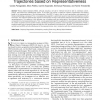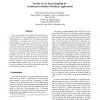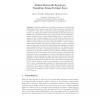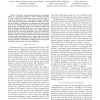153
click to vote
TKDE
2012
13 years 4 months ago
2012
—Moving Object Databases (MOD), although ubiquitous, still call for methods that will be able to understand, search, analyze, and browse their spatiotemporal content. In this pap...
127
click to vote
PERVASIVE
2011
Springer
14 years 4 months ago
2011
Springer
We contribute a method for approximating users’ interruptibility costs to use for experience sampling and validate the method in an application that learns when to automatically ...
120
click to vote
SIGMETRICS
1999
ACM
15 years 6 months ago
1999
ACM
This paper examines the feasibility of performing architectural studies with trace sampling for a suite of desktop application traces on Windows NT. This paper makes three contrib...
114
click to vote
AI
2004
Springer
15 years 7 months ago
2004
Springer
To address the of mining a huge volume of geographically distributed databases, we propose two approaches. The first one is to download only a sample of each database. The second ...
135
click to vote
IMC
2006
ACM
15 years 8 months ago
2006
ACM
This paper addresses the difficult problem of selecting representative samples of peer properties (e.g., degree, link bandwidth, number of files shared) in unstructured peer-to-p...
124
click to vote
INFOCOM
2006
IEEE
15 years 8 months ago
2006
IEEE
— Peer-to-peer systems are becoming increasingly popular, with millions of simultaneous users and a wide range of applications. Understanding existing systems and devising new pe...
124
click to vote
SSDBM
2008
IEEE
15 years 8 months ago
2008
IEEE
Random sampling is a popular technique for providing fast approximate query answers, especially in data warehouse environments. Compared to other types of synopses, random sampling...
114
click to vote
INFOCOM
2009
IEEE
15 years 8 months ago
2009
IEEE
—This paper presents Respondent-Driven Sampling (RDS) as a promising technique to derive unbiased estimates of node properties in unstructured overlay networks such as Gnutella. ...




